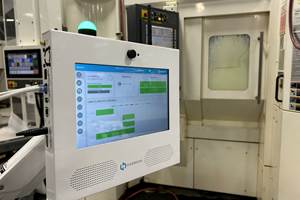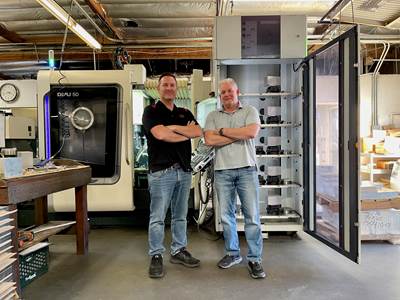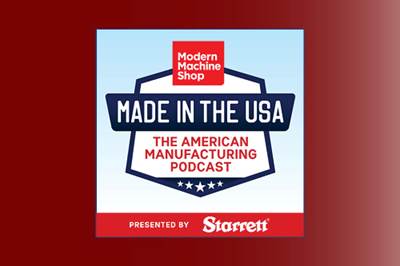Addressing the Manufacturing Labor Shortage Needs to Start Here
Student-run businesses focused on technical training for the trades are taking root across the U.S. Can we — should we — leverage their regional successes into a nationwide platform?
Share




When Mr. Cegielski’s sixth-grade class holds a business meeting with a potential customer, the children are to follow three fundamental rules about how to drink a soda during the meeting. Rule 1: No shoving or tackling those in front of you to get your soda first. Rule 2: Open your soda before the meeting starts. No one wants to hear the slow crack of your soda can while people are trying to talk. Rule 3: During the meeting, place your soft drink in front of you on the table, not in your lap or on the floor or in your hand. Rule 3b: Resist the urge to crinkle or crush your can during the meeting, no matter how satisfying it may be.
Mr. Cegielski is a middle and high school technical education instructor and the founder of Cardinal Manufacturing, a student-run business in Strum, Wisconsin. This magazine has covered Cardinal Manufacturing several times over the program’s 16-year existence, and its focus on teaching both soft skills and technical training from an early age has been hugely successful.
Cardinal’s custom job shop within Eleva-Strum Central High School is a clean, bright, open space loaded with machines and equipment for everything from welding to CNC machining to design and woodworking. Besides Cegielski, fellow instructor Tyson Rohrsheib and program coordinator Rachel Odegard, the business is run by less than two dozen high school seniors — students who have taken the required prerequisite classes (including Metalworking I and II) and who devote two class periods each day to performing real work for real customers.
I talked to Cegielski recently about how these seniors prepare for their jobs and was interested to hear that the prep work begins early. How to initiate a conversation, how to shake hands, how to communicate with peers and clients, how to arrive on time — and yes, how to drink a can of soda during a meeting — these lessons in soft skills begin in sixth grade, at the earliest middle-school level. Such lessons are key not only to the students’ success at Cardinal Manufacturing when they become high school seniors, but also vital to employers in the region. In fact, Cegielski has heard time and again from local employers who weigh mastery of soft skills as much or more than mastery of technical skills when making hiring decisions.
To machine shops, job shops and OEMs in a metalworking industry doing its best to automate its way through a skilled labor shortage, Cardinal Manufacturing feels like an oasis. When I talked recently with Roger Atkins, president of the National Tooling & Machining Association (NTMA), he was aware and appreciative of Cardinal’s work and the model of manufacturing education and training the school provides. But programs like Cardinal Manufacturing have a big problem, Atkins says: There are simply not enough of them. And there are seemingly no efforts by federal or state governments to network or integrate the programs that do exist into a national platform that can receive federal or state funds. Politics is part of the issue.
“We were just in Washington the other day. We flew in about 12 of us and met with members of Congress and senators and staff members,” Atkins says. “And of course, the number one thing we're bringing up is manufacturing workforce development. Are they aware of it? Yes, they're keenly aware of it. Do they know what to do? I'm not sure they know what to do.” The reality, Atkins told me, is that almost nobody on Capitol Hill wants the opposing party to be a winner in D.C.
Atkins says he encounters this attitude when he meets with politicians on both sides of the aisle — even those who espouse a pro-manufacturing agenda. Is it naïve to assume that the creation of a federal education program for technical training and the trades that begins in middle school — a program like Germany’s dual-track vocational training program (which, to be clear, faces its own challenges) — would be a triumph for both sides of the political spectrum?
These are great programs, Atkins says, and there are perhaps dozens of them spread out throughout the country. (Shoutout to Eagle Manufacturing in Nashville, Indiana.) The problem is that they are currently unnetworked. Similarly, all 50 states have federally funded Manufacturing Extension Partnership (MEP) centers that exist to strengthen and empower U.S. manufacturers. But there can be a frustrating lack of alignment between the regional partner organizations that some MEPs manage. Facing this, how can we leverage the success of programs like Cardinal Manufacturing that are taking root across the U.S.? I welcome your thoughts. Email me at bdonaldson@mmsonline.com.
Related Content
Can Connecting ERP to Machine Tool Monitoring Address the Workforce Challenge?
It can if RFID tags are added. Here is how this startup sees a local Internet of Things aiding CNC machine shops.
Read MoreThe Power of Practical Demonstrations and Projects
Practical work has served Bridgerland Technical College both in preparing its current students for manufacturing jobs and in appealing to new generations of potential machinists.
Read MoreDN Solutions Responds to Labor Shortages, Reshoring, the Automotive Industry and More
At its first in-person DIMF since 2019, DN Solutions showcased a range of new technologies, from automation to machine tools to software. President WJ Kim explains how these products are responses to changes within the company and the manufacturing industry as a whole.
Read MoreFinding the Right Tools for a Turning Shop
Xcelicut is a startup shop that has grown thanks to the right machines, cutting tools, grants and other resources.
Read MoreRead Next
There's Your Waste, Shaw! An Argument for Shop Reinvestment
The fictional Don Walling had it right: Innovation and long-term success for machine shops requires investments in technology and people. Not just one, but both.
Read MoreAn American Manufacturing Story
For manufacturers that choose to move or keep production in the United States, what are the challenges and opportunities that motivate them?
Read MoreBuilding Out a Foundation for Student Machinists
Autodesk and Haas have teamed up to produce an introductory course for students that covers the basics of CAD, CAM and CNC while providing them with a portfolio part.
Read More































